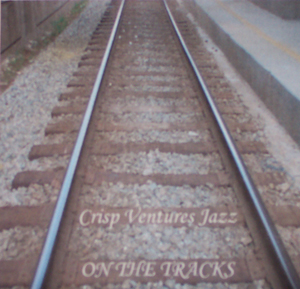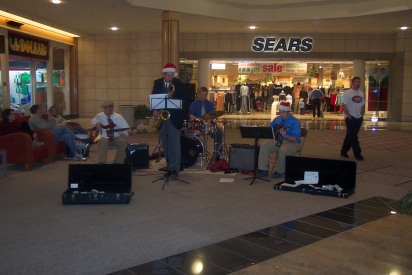Crisp Ventures – Straight, No…wait, just completely Straight
OK, maybe it’s a little harsh to criticize my own work, but I needed something to write about and Tom suggested (mockingly) to talk about my stellar solo on “Straight, No Chaser” from our jazz combo Crisp Venture’s album On The Tracks. Instead, I’ve decided to review the entire thing.
Artist: Crisp Ventures
Album: On The Tracks
Personnel: Tom Billheimer (tenor/alto saxophone), Jason Feltis (guitar), Andrew Cleveland (bass),
Ben Stanley (drums).
Produced by Danny Slaughter.
Let’s get this part out of the way. This jazz combo consists of four high school musicians playing for fun and a few competitions, not highly skilled accomplished musicians recording a major jazz odyssey. The album was recorded in one session at a church in Greensboro, NC with hopes that the CD would lead to more paying gigs and hopefully a little bit of extra cash to spend as well.
Because the group is only a quartet, all of the melody duties are relegated to the saxophone player, Tom. Even though sometimes the melody can feel, a tad, shall we say, “square”, its the strongest part of the album. The melody is always on target, with very few mistakes and with enough style to pass as jazz. It should be noted that sometimes the melodies are too on target, and could use some of Tom’s own personal interpretation. The best recordings of jazz standards have melodies played liberally by some great jazz musician who isn’t afraid to take a risk. That aside, his clean, crisp style on the track “Vookristal” can be described as a ‘dry martini’. Billheimer is never wrong on tracks like “Straight, No Chaser” and “Take The A-Train”, but sometimes being wrong is what really makes a song.
The other prominent member of the group heard is the guitarist, Jason Feltis. While his soloing will be discussed later, his accompaniment, or ‘comping’ as its known in the jazz world, to the melodies is adequate at best. One some songs, such as “Straight, No Chaser”, his rhythms are sporadic and not consistently “in the pocket” set by Stanley. Other times, Feltis really shines, his chord-voicings behind “Vookistral” are intriguing and captivating to the ear, with enough tension preceding resolution to keep the listener in his grasp. Feltis takes an interesting approach to the 3/4 ballad “Someday My Prince Will Come” with an approach that is almost “Waltz-ish”, complementing the soft sweet sound of the saxophone. Another thing that impresses this reviewer is Feltis’ comping on “Canteloupe Island”, he really pushes the groove and the use of the whammy bar in the bridge sets the song apart.
The two rocks of the group, Stanley (drums) and Cleveland (bass), provide the backbone for the group to play over. Stanley’s playing is very stylistic, loud, and unabashed. He’s not afraid to make a mistake, and even though sometimes a cue or two is rushed, his play is solid and serves its purpose. He does a wonderful job accenting the solos of Feltis and Billheimer on the track “Straight, No Chaser”, driving the ‘chug-chug’ start of “Take The A-Train”, and the ornamenting the interlude of “Cantaloupe Island”. While some of the album grooves really well (see: “Cantaloupe Island”), the rest is lacking and in serious need of a “pocket.” Much of this can be contributed to Cleveland’s bass playing, or lack thereof. The nonexistance of the bass in the mix, whether its due to Cleveland’s timid playing, or the actual production of the album, really hurts the over all sound. Despite the occasional root that pops out, Cleveland is never heard, which is shame because a strong sturdy bassline is really what this album could use at times. It can be assumed that his playing was probably very solid regardless of whether or not it made it to the final mix.
With all of that mentioned, the album itself is an eclectic mix of jazz standards and modern tunes. “Straight, No Chaser”, the famous Monk F-blues track, is reportedly the group’s signature song, but it appears that Feltis developed a signature lick for this song as well. He seems to be stuck on a rhythm during his improvisation, and never gets out of the rut. This same rhythm can also be heard in his solo over “A-Train”s changes, but not as predominant. As the intro track, this song grabs the listener’s ear right away with an introduction that sounds well-rehearsed and includes the famous “cry me a river” lick to phase into the song. “Straight, No Chaser” also includes an impressive ‘trade-fours’ section with Billheimer, Feltis, and Stanley. The group really excels in this aspect, and is an impressive way to begin the album.
The two soft tracks on the album “Vookristal” and “Someday My Prince Will Come” include some of the best work on the album. The alto sax on Sailor’s “Vookistral” is the crispest Billheimer sound on the album. Of course, this may be because that is Tom’s primary instrument. The track itself is too repetitive, and though the group gives it a strong effort, the song was doomed from the start to entertain elevator passengers. Some critics, including this one feel that Crisp Venture’s best work is on “Someday My Prince Will Come.” Although it hardly stands up to the Miles version, it does surprise the listener to hear a completely different sound than the rest of the album. The track also features Feltis’ best guitar-work.
Two pieces on On The Tracks are fun for the listener; Strayhorn’s “Take The A-Train” and Silver’s “Song For My Father.” The group seems to let loose more on these tracks, and seems to enjoy playing these tunes more than the others. While the introduction to “A-Train” may seem a tad cliche, it is superbly performed and brings the song up a danceable tempo, something not entirely common on this album. The only low point from this track is the guitar solo, it seems that Feltis has a hard time finding the right sound over the changes and keeps jumping from pitch to pitch with reckless disregard for melody. “Song For My Father” really picks up during Feltis’ solo though, as the band makes the jump to double time with a Samba feel. Fans of the group have often mentioned that while these recordings are strong, the band’s live performance of these two tunes were much stronger and the CD does not capture the fun as well as it could have.
Concluding the CD with a strong groove feel is the Hancock tune “Cantaloupe Island”, but it is yet another tune that could benefit greatly from having a more prominent bassline. We’ve all heard the track before, and the bassline is wellknown so its absence is easily noticed. With strong improvisations from both Billheimer and Feltis, and an easily followed beat from Stanley, “Island” really shines on the album. The interlude during Feltis’ solo is one of the highlights of the entire album, and the track is the perfect ending to a CD in need of a strong finish.
All in all, On The Tracks should be taken for what it is, an album cut by a few high school jazz musicians with minimal training and experience. For such little accomplishments, the effort is stellar and is worth at least a few listens. Its a great start for a group with lots of potential. This reviewer will give it a 1 thumbs up, with an extra third of a thumb thrown on top because of how young and inexperienced the musicians were.
Conclusion: A fun CD for the occasional jazz fan, relatives, and restaurant owners looking for jazz combos.
Crisp Ventures playing a famous mall gig
Posted on December 13, 2006, in Entertainment, Music. Bookmark the permalink. 2 Comments.






Dude,
That album is my all time favorite. A jazz standard that all should strive to live up to. I think you’ve been too harsh. Crisp Ventures was the strongest combo that high school has seen or will see for a long time.
итак: благодарю!